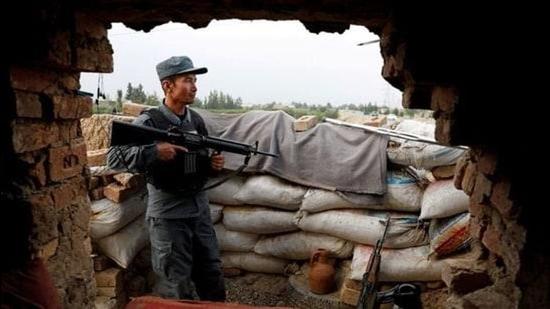More global support needed for Afghanistan to contain Taliban’s campaign
A dynamic strategy that focuses on securing the most important Afghan provinces and good military leadership will be key for the Afghan forces.
The next two to three months are crucial for blunting the Taliban’s campaign to capture territory across Afghanistan, with the group benefiting from active logistical and tactical support from across the border in Pakistan.

Since the US announced its intention to withdraw all its forces from Afghanistan earlier this year, the Taliban have focused on capturing as much territory as possible, especially in rural areas, and taking control of border crossings with countries such as Iran, Turkmenistan, Tajikistan and Pakistan.
India believes the best-case scenario is a political settlement based on a power-sharing agreement in Kabul that retains the constitutional systems and institutions built up over the past two decades, and is open to possible changes to the existing system to accommodate all stakeholders.
The Afghan defence forces, which lost some of their earlier momentum in recent weeks, have now begun reorienting their strategy to contain the Taliban campaign but will require more support from the international community to intensify their operations, people familiar with developments said on condition of anonymity.
A dynamic strategy that focuses on securing the most important Afghan provinces and good military leadership will be key for the Afghan forces in the coming weeks, especially as there are indications that the Taliban will widen its campaign in August to target provincial capitals and urban areas, particularly in Kandahar, Helmand, Paktia and Ghazni.
The Afghan forces have also benefited from a shake-up of the higher echelons of the security set-up, during which President Ashraf Ghani replaced his defence and interior ministers and the army chief to sharpen the fight against the Taliban.
The people pointed to the $3.3 billion pledged by the US last month for Afghan forces – including $1 billion to ensure the air force can support combat operations and for the delivery of additional aircraft, $1 billion to purchase supplies such as fuel, ammunition and spare parts, and $700 million to pay the salaries of Afghan troops – but said more backing from the international community will be needed in terms of air support, maintenance of air assets and intelligence and surveillance.
The Afghan forces have to adjust to the new reality and are expected to continue the fight as long as salaries are paid and there is good leadership, the people said.
The Taliban have benefited from the logistical and tactical support from Pakistani soil, and all supply lines from the Pakistani side remain open, the people said. There are reports that thousands of Pakistani terrorists from groups such as Lashkar-e-Taiba (LeT) and Jaish-e-Mohammed (JeM) are fighting in Afghanistan while Pakistani identity cards had been found on many fighters killed in recent weeks.
There are also reports of terrorists injured in Afghanistan being treated at hospitals in the Pakistani cities of Chaman and Quetta, both in Balochistan province, and pro-Taliban rallies have been organised in Quetta and Peshawar, the capital of Khyber-Pakhtunkhwa province. Madrassas or seminaries in Balochistan and Khyber-Pakhtunkhwa have issued calls for men to join the jihad in Afghanistan.
In the past year, most terrorists based in Pakistan’s North and South Waziristan regions have also been pushed into Afghanistan. These developments have coincided with greater scrutiny of Pakistan’s efforts to curb terrorism by Western powers and watchdogs such as the Financial Action Task Force (FATF).
For India, the presence of fighters from the LeT, the JeM and the Haqqani Network, which has deep-rooted ties with Pakistan’s military, remains a key concern. The Haqqani Network was linked to attacks on the Indian embassy in Kabul in 2008 and 2009 and the network also has ties with Al-Qaeda.
The people also described reports of the Taliban controlling 85% of Afghan territory as exaggerated and said the group is believed to control about 45% of the country or about 212 of the 420-odd districts, while more than 110 districts are under government control.
In the worst-case scenario, of all the Afghan stakeholders failing to reach an agreement on a political settlement and the Taliban capturing power by force, there are fears that the group won’t be able to control all parts of Afghanistan, leaving ungoverned areas that could be used by foreign terrorists to pose a threat to countries across the region, including several Central Asian states.
“The Central Asian states will be most affected in terms of security. China too has its concerns about groups like East Turkestan Islamic Movement (ETIM). The Tajikistan border is the most tense now as large stretches are controlled by the Taliban,” one of the people cited above said.
While the core ideology of the Taliban – including the establishment of an Islamic emirate and disregard for human rights – remains unchanged, the group is not a monolith and has several power centres and factions. While some Taliban commanders on the ground believe they have won the war, others such as the political leadership based in Doha have a different outlook and some are open to power-sharing.
The Taliban are learning from their experiences and they don’t want to be seen as taking over provinces by force. They also want some sort of recognition from the world, and are visiting Iran and Russia to get “some sort of legitimacy”, the people said.
These factors are also believed to have shaped India’s move to open channels of communication with the Taliban, as first reported by Hindustan Times. The external affairs ministry has not formally confirmed such contacts but has said India is in touch with “various stakeholders”.
Though there are differences in the approaches of countries such as Iran, Russia and the US to the Afghanistan issue, there is convergence in opposing any forcible or military takeover in Kabul, the people said.




